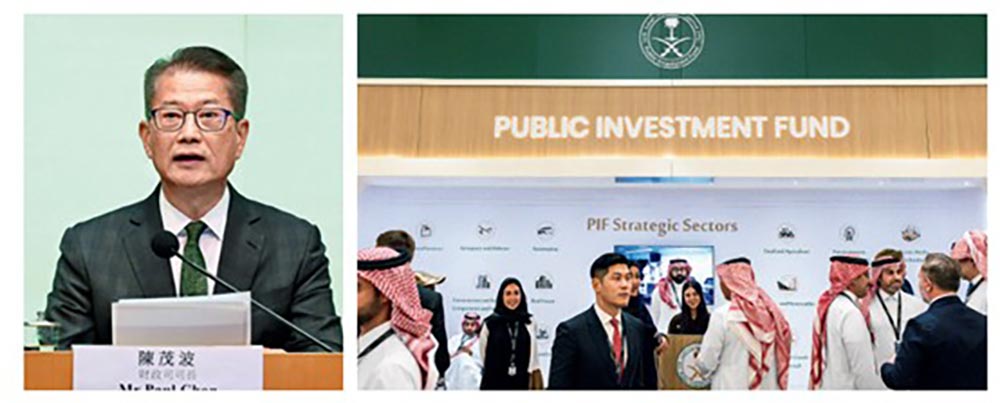
去年10月,,香港財(cái)政司司長(zhǎng)陳茂波前往沙特阿拉伯首都,,也是沙特證券交易所所在地利雅得,。在沙特官員見(jiàn)證下,陳茂波按下按鈕,,啟動(dòng)了中東地區(qū)最大的交易所交易基金(ETF),。該基金規(guī)模12億美元,追蹤在中國(guó)香港上市的30家符合伊斯蘭教法的公司(大型銀行匯豐因收取利息不符合標(biāo)準(zhǔn)被排除在外),。
由于香港努力與海灣地區(qū)新興資本加強(qiáng)聯(lián)系,,陳茂波與香港交易所集團(tuán)行政總裁陳翊庭(與陳茂波無(wú)親屬關(guān)系)等幾位同僚頻繁出訪中東地區(qū)。
“過(guò)去三四年,,國(guó)泰航空香港到迪拜的航班一直爆滿,,”匯豐銀行首席亞洲經(jīng)濟(jì)學(xué)家范力民(Frederic Neumann)表示。(他補(bǔ)充說(shuō),,自己“前往中東也比以前頻繁”),。
如今眾多亞洲經(jīng)濟(jì)體都在努力吸引海灣地區(qū)的資金,香港只是其中之一,,資金來(lái)源也不僅是個(gè)人投資者,。中東的主權(quán)財(cái)富基金,不管是沙特阿拉伯萬(wàn)億美元規(guī)模的公共投資基金(PIF),,還是阿聯(lián)酋一系列投資機(jī)構(gòu),,都在將目光轉(zhuǎn)向東方。海灣地區(qū)投資者希望實(shí)現(xiàn)投資多元化,,亞洲擁有年輕的人口結(jié)構(gòu),、充滿活力的科技行業(yè)和快速增長(zhǎng)的經(jīng)濟(jì)體,提供了最具吸引力的投資機(jī)會(huì),。
“海灣國(guó)家要尋找新市場(chǎng),,最具吸引力的新市場(chǎng)就在亞洲,”總部位于迪拜的地緣政治風(fēng)險(xiǎn)咨詢公司蓋特豪斯咨詢(Gatehouse Advisory)合伙人瓦蘇基·沙斯特里(Vasuki Shastry)解釋道,,“如果能與其他投資基金合作,,說(shuō)不定就能發(fā)掘出下一個(gè)馬云,下一個(gè)超級(jí)潛力股,?!?/p>
然而,日益緊密的金融聯(lián)系不只是商業(yè)行為,。從戰(zhàn)略層面來(lái)看,,中東正努力構(gòu)建后石油時(shí)代的經(jīng)濟(jì)格局,;從地緣政治角度而言,海灣地區(qū)和亞洲都在努力對(duì)沖風(fēng)險(xiǎn),,因?yàn)槊绹?guó)不斷施展經(jīng)濟(jì)影響力,,新上臺(tái)的特朗普政府可能攪動(dòng)貿(mào)易和投資關(guān)系。

中東各國(guó)政府最初(現(xiàn)在仍然)在資金管理上更傾向于歐洲為中心,。像沙特阿拉伯,、科威特和阿聯(lián)酋等國(guó)都將石油收入投入到北美和歐洲發(fā)達(dá)經(jīng)濟(jì)體的公開(kāi)市場(chǎng)。舉個(gè)例子,,據(jù)智庫(kù)亞洲之家的數(shù)據(jù),,阿布扎比穆巴達(dá)拉投資公司(Mubadala Investment Co.)近一半海外投資流向了美國(guó),遠(yuǎn)超其他任何地區(qū),,投向中國(guó)的資金僅占2%,。
這意味著沙特、阿聯(lián)酋等海灣合作委員會(huì)(GCC)國(guó)家的投資者“在亞洲崛起的過(guò)程中有點(diǎn)錯(cuò)失了良機(jī)”,,范力民說(shuō),。如今,中東正努力追趕,。
另一方面,,隨著西方國(guó)家加強(qiáng)對(duì)海外投資的審查,海灣投資者也在尋求豐富投資組合的選擇,。去年,,英國(guó)阻止了阿聯(lián)酋支持的《每日電訊報(bào)》收購(gòu)計(jì)劃,歐洲各國(guó)政府也對(duì)海灣實(shí)體試圖增持本地電信公司表示不滿,。
“海灣資本想收購(gòu)西方資產(chǎn)可不容易,,”沙斯特里說(shuō),“海灣國(guó)家對(duì)于此類投資受到的審查感到不自在,?!?/p>
所以海灣地區(qū)將目光投向其他市場(chǎng),尤其是亞洲,?!爸袞|主權(quán)財(cái)富基金在亞洲的投資策略一直相當(dāng)激進(jìn),”牛津大學(xué)(University of Oxford.)主權(quán)財(cái)富基金專家阿納·納克瓦洛瓦伊特(Ana Nacvalovaite)說(shuō),。
海灣對(duì)亞洲的投資規(guī)模雖小,,但不斷增長(zhǎng)。據(jù)跟蹤主權(quán)投資的全球主權(quán)財(cái)富基金數(shù)據(jù)顯示,2022年至2024年間沙特公共投資基金對(duì)亞洲經(jīng)濟(jì)體投資了66億美元,,是此前三年投資金額的兩倍,。同一時(shí)期,阿布扎比投資局(Abu Dhabi Investment Authority),、穆巴達(dá)拉投資公司和卡塔爾投資局(Qatar Investment Authority)等海灣合作委員會(huì)基金也增加了對(duì)亞洲的投資。
海灣投資者對(duì)亞洲的期望不僅僅是投資回報(bào),。匯豐銀行的范力民認(rèn)為,,中東基金正“努力獲取有助于本國(guó)經(jīng)濟(jì)發(fā)展的技術(shù)和專業(yè)知識(shí)”。
海灣投資者,,尤其是阿聯(lián)酋投資者一直喜歡在印度投資,,主要因?yàn)橛《扰c海灣地區(qū)有長(zhǎng)期的貿(mào)易和商業(yè)聯(lián)系?!氨姸嘤《葍|萬(wàn)富翁住在阿聯(lián)酋,,彼此之間很熟悉,”沙斯特里說(shuō),,“在印度投資就像在自家門口投資一樣,。”
還有中國(guó),,中東石油的重要買家之一,。范力民表示,海灣合作委員會(huì)對(duì)中國(guó)的投資比在其他地方“針對(duì)性”更強(qiáng),,“投資中國(guó)是因?yàn)榈鼐墤?zhàn)略多元化和獲取技術(shù)的雙重需求,。”
納克瓦洛瓦伊特表示,,中東投資者正在關(guān)鍵領(lǐng)域?qū)ふ抑卮髾C(jī)會(huì),,而亞洲的關(guān)鍵領(lǐng)域就是科技。以電動(dòng)汽車為例:2023年底,,與阿布扎比政府旗下專注移動(dòng)出行領(lǐng)域的CYVN控股公司,,向中國(guó)電動(dòng)汽車初創(chuàng)企業(yè)蔚來(lái)投資了22億美元。
電子游戲是另一個(gè)引起中東關(guān)注的新興領(lǐng)域,。沙特公共投資基金在游戲領(lǐng)域進(jìn)行了多筆投資,,包括持有任天堂(Nintendo)、卡普空(Capcom)和Nexon等公司股份,,還投資了中國(guó)電競(jìng)公司英雄電競(jìng),。
總部即將遷往阿布扎比的電競(jìng)公司NIP集團(tuán)創(chuàng)始人希查姆·查伊內(nèi)(Hicham Chahine)表示,海灣地區(qū)對(duì)電競(jìng)行業(yè)的興趣有助于投資者打入蓬勃發(fā)展的市場(chǎng):“中國(guó)是全球最大的游戲市場(chǎng),。印度,、東南亞、日本和韓國(guó)的潛力也不小。在游戲和電競(jìng)方面東方國(guó)家一直比西方領(lǐng)先,?!?/p>
最后是東南亞,尤其是以穆斯林人口為主的馬來(lái)西亞和印度尼西亞,,兩個(gè)國(guó)家希望借助共有的文化和宗教紐帶吸引投資,。“印尼人和馬來(lái)西亞人非??粗匚幕嗨菩?,”沙斯特里解釋道。
在東南亞,,海灣投資者將資金投向房地產(chǎn),、數(shù)據(jù)中心、原材料和基礎(chǔ)設(shè)施等領(lǐng)域,。最近印度尼西亞從阿聯(lián)酋獲得了100億美元的投資承諾,,用于成立新的可再生能源合資企業(yè),該項(xiàng)目獲得了印尼新成立的達(dá)南塔拉(Danantara)主權(quán)財(cái)富基金支持,。
達(dá)南塔拉首席投資官潘杜·夏吉里(Pandu Sjahrir)表示,,基金成立過(guò)程中阿布扎比投資者一直“保持密切聯(lián)系”。他對(duì)印尼從海灣地區(qū)獲得更多投資相當(dāng)樂(lè)觀,?!八麄儼l(fā)現(xiàn)印尼擁有豐富的資源、廉價(jià)能源還有龐大的人口,,尤其是消費(fèi)領(lǐng)域優(yōu)勢(shì)明顯,。過(guò)去八到十年里,他們從印尼賺了錢,,所以想加大投資力度,。”
亞洲金融中心也在努力吸引更多中東投資,。香港和新加坡都是財(cái)富管理和家族辦公室匯聚之地,,目前兩地都在大力吸引海灣富人的資金。
香港尤其積極,。2023年,,香港官員曾大膽嘗試邀請(qǐng)石油巨頭沙特阿美(Saudi Aramco)在香港二次上市,不過(guò)目前尚未成功,。與此同時(shí),,港交所在利雅得開(kāi)了辦事處。沙特證券交易所組織的資本市場(chǎng)論壇也在香港舉辦,。
匯豐銀行的范力民承認(rèn),,現(xiàn)在還“很難判斷”香港吸引中東資金的努力是否奏效,。不過(guò)香港與中國(guó)內(nèi)地聯(lián)系緊密,可能在吸引資金流動(dòng)方面更具優(yōu)勢(shì),,畢竟中國(guó)是技術(shù)來(lái)源地,、石油買家以及潛在的安全合作伙伴?!百Y金流向確實(shí)會(huì)受到當(dāng)下政治現(xiàn)實(shí)的影響,,”他說(shuō)。
沙特和阿聯(lián)酋努力在國(guó)內(nèi)和國(guó)際上投資的同時(shí),,亞洲國(guó)家和公司也在謀求對(duì)海灣地區(qū)投資,。不少中國(guó)大型企業(yè)選擇向中東拓展業(yè)務(wù)。例如,,去年中國(guó)外賣巨頭美團(tuán)在沙特推出了服務(wù),,這是該公司首次在中國(guó)境外開(kāi)展業(yè)務(wù),。
“對(duì)中國(guó)企業(yè)來(lái)說(shuō),,中東是最賺錢的市場(chǎng),”沙斯特里說(shuō),,尤其是美國(guó)和歐洲等發(fā)達(dá)市場(chǎng)紛紛對(duì)中國(guó)商品加征關(guān)稅的情況下,。他補(bǔ)充道,迪拜“滿大街都是中國(guó)制造的汽車”,。據(jù)研究公司Canalys的數(shù)據(jù),,傳音、小米和榮耀三家中國(guó)手機(jī)品牌在中東市場(chǎng)(包括沙特等海灣國(guó)家,,以及伊拉克,、黎巴嫩、約旦和以色列)占據(jù)了37%的份額,,超過(guò)了蘋果或三星的市場(chǎng)份額,。
尋找新市場(chǎng)的中國(guó)企業(yè)或許能得到海灣政府的幫助。像沙特公共投資基金之類基金就迫切希望投資本國(guó)經(jīng)濟(jì),,利用資金吸引新的國(guó)內(nèi)辦公機(jī)構(gòu)和制造中心落地,。今年1月初,個(gè)人電腦制造商聯(lián)想獲得了與沙特公共投資基金旗下公司埃耐特(Alat)的20億美元投資,,在利雅得成立了新的中東總部,,并在沙特建了工廠。
其實(shí)早在特朗普上臺(tái)之前,,海灣國(guó)家就在考慮其他選擇,。去年,沙特阿拉伯和阿聯(lián)酋表示正考慮加入金磚國(guó)家,,這一國(guó)際集團(tuán)正日益成為可與西方抗衡的力量,。如今,阿聯(lián)酋已成為正式成員。
然而,,中東地區(qū)與美國(guó)的安全聯(lián)系緊密,,可能導(dǎo)致海灣地區(qū)與中國(guó)建立不受限制的金融關(guān)系變得困難。2023年,,美國(guó)對(duì)阿聯(lián)酋人工智能公司G42越發(fā)關(guān)注,,該公司與中國(guó)科技公司關(guān)系密切,包括被美國(guó)制裁的華為,。到2023年年底,,G42同意切斷與中國(guó)硬件供應(yīng)商的聯(lián)系,首席執(zhí)行官肖鵬承認(rèn)公司無(wú)法“同時(shí)與中美兩方合作”,。幾個(gè)月后,,微軟便迅速對(duì)其投資了15億美元。
不過(guò),,海灣國(guó)家可能認(rèn)為,,在日益復(fù)雜的世界中投資需要一些靈活性?!暗鼐壵维F(xiàn)實(shí)促使全球投資者如更注重多元化,,中東投資者也不例外,”匯豐銀行的范力民表示,。
印尼達(dá)南塔拉公司的潘杜則堅(jiān)信,,海灣國(guó)家會(huì)被印尼提供的機(jī)會(huì)吸引:“海灣錯(cuò)過(guò)了印度,又錯(cuò)過(guò)了中國(guó),,他們不想再錯(cuò)過(guò)這次機(jī)會(huì),。”(財(cái)富中文網(wǎng))
去年10月,,香港財(cái)政司司長(zhǎng)陳茂波前往沙特阿拉伯首都,,也是沙特證券交易所所在地利雅得。在沙特官員見(jiàn)證下,,陳茂波按下按鈕,,啟動(dòng)了中東地區(qū)最大的交易所交易基金(ETF)。該基金規(guī)模12億美元,,追蹤在中國(guó)香港上市的30家符合伊斯蘭教法的公司(大型銀行匯豐因收取利息不符合標(biāo)準(zhǔn)被排除在外),。
由于香港努力與海灣地區(qū)新興資本加強(qiáng)聯(lián)系,陳茂波與香港交易所集團(tuán)行政總裁陳翊庭(與陳茂波無(wú)親屬關(guān)系)等幾位同僚頻繁出訪中東地區(qū),。
“過(guò)去三四年,,國(guó)泰航空香港到迪拜的航班一直爆滿,”匯豐銀行首席亞洲經(jīng)濟(jì)學(xué)家范力民(Frederic Neumann)表示,。(他補(bǔ)充說(shuō),,自己“前往中東也比以前頻繁”),。
如今眾多亞洲經(jīng)濟(jì)體都在努力吸引海灣地區(qū)的資金,香港只是其中之一,,資金來(lái)源也不僅是個(gè)人投資者,。中東的主權(quán)財(cái)富基金,不管是沙特阿拉伯萬(wàn)億美元規(guī)模的公共投資基金(PIF),,還是阿聯(lián)酋一系列投資機(jī)構(gòu),,都在將目光轉(zhuǎn)向東方。海灣地區(qū)投資者希望實(shí)現(xiàn)投資多元化,,亞洲擁有年輕的人口結(jié)構(gòu),、充滿活力的科技行業(yè)和快速增長(zhǎng)的經(jīng)濟(jì)體,提供了最具吸引力的投資機(jī)會(huì),。
“海灣國(guó)家要尋找新市場(chǎng),,最具吸引力的新市場(chǎng)就在亞洲,”總部位于迪拜的地緣政治風(fēng)險(xiǎn)咨詢公司蓋特豪斯咨詢(Gatehouse Advisory)合伙人瓦蘇基·沙斯特里(Vasuki Shastry)解釋道,,“如果能與其他投資基金合作,,說(shuō)不定就能發(fā)掘出下一個(gè)馬云,下一個(gè)超級(jí)潛力股,?!?/p>
然而,,日益緊密的金融聯(lián)系不只是商業(yè)行為,。從戰(zhàn)略層面來(lái)看,中東正努力構(gòu)建后石油時(shí)代的經(jīng)濟(jì)格局,;從地緣政治角度而言,,海灣地區(qū)和亞洲都在努力對(duì)沖風(fēng)險(xiǎn),因?yàn)槊绹?guó)不斷施展經(jīng)濟(jì)影響力,,新上臺(tái)的特朗普政府可能攪動(dòng)貿(mào)易和投資關(guān)系,。
中東各國(guó)政府最初(現(xiàn)在仍然)在資金管理上更傾向于歐洲為中心。像沙特阿拉伯,、科威特和阿聯(lián)酋等國(guó)都將石油收入投入到北美和歐洲發(fā)達(dá)經(jīng)濟(jì)體的公開(kāi)市場(chǎng),。舉個(gè)例子,據(jù)智庫(kù)亞洲之家的數(shù)據(jù),,阿布扎比穆巴達(dá)拉投資公司(Mubadala Investment Co.)近一半海外投資流向了美國(guó),,遠(yuǎn)超其他任何地區(qū),投向中國(guó)的資金僅占2%,。
這意味著沙特,、阿聯(lián)酋等海灣合作委員會(huì)(GCC)國(guó)家的投資者“在亞洲崛起的過(guò)程中有點(diǎn)錯(cuò)失了良機(jī)”,范力民說(shuō),。如今,,中東正努力追趕,。
另一方面,隨著西方國(guó)家加強(qiáng)對(duì)海外投資的審查,,海灣投資者也在尋求豐富投資組合的選擇,。去年,英國(guó)阻止了阿聯(lián)酋支持的《每日電訊報(bào)》收購(gòu)計(jì)劃,,歐洲各國(guó)政府也對(duì)海灣實(shí)體試圖增持本地電信公司表示不滿,。
“海灣資本想收購(gòu)西方資產(chǎn)可不容易,”沙斯特里說(shuō),,“海灣國(guó)家對(duì)于此類投資受到的審查感到不自在,。”
所以海灣地區(qū)將目光投向其他市場(chǎng),,尤其是亞洲,。“中東主權(quán)財(cái)富基金在亞洲的投資策略一直相當(dāng)激進(jìn),,”牛津大學(xué)(University of Oxford.)主權(quán)財(cái)富基金專家阿納·納克瓦洛瓦伊特(Ana Nacvalovaite)說(shuō),。
海灣對(duì)亞洲的投資規(guī)模雖小,但不斷增長(zhǎng),。據(jù)跟蹤主權(quán)投資的全球主權(quán)財(cái)富基金數(shù)據(jù)顯示,,2022年至2024年間沙特公共投資基金對(duì)亞洲經(jīng)濟(jì)體投資了66億美元,是此前三年投資金額的兩倍,。同一時(shí)期,,阿布扎比投資局(Abu Dhabi Investment Authority)、穆巴達(dá)拉投資公司和卡塔爾投資局(Qatar Investment Authority)等海灣合作委員會(huì)基金也增加了對(duì)亞洲的投資,。
海灣投資者對(duì)亞洲的期望不僅僅是投資回報(bào),。匯豐銀行的范力民認(rèn)為,中東基金正“努力獲取有助于本國(guó)經(jīng)濟(jì)發(fā)展的技術(shù)和專業(yè)知識(shí)”,。
海灣投資者,,尤其是阿聯(lián)酋投資者一直喜歡在印度投資,主要因?yàn)橛《扰c海灣地區(qū)有長(zhǎng)期的貿(mào)易和商業(yè)聯(lián)系,?!氨姸嘤《葍|萬(wàn)富翁住在阿聯(lián)酋,彼此之間很熟悉,,”沙斯特里說(shuō),,“在印度投資就像在自家門口投資一樣?!?/p>
還有中國(guó),,中東石油的重要買家之一。范力民表示,,海灣合作委員會(huì)對(duì)中國(guó)的投資比在其他地方“針對(duì)性”更強(qiáng),,“投資中國(guó)是因?yàn)榈鼐墤?zhàn)略多元化和獲取技術(shù)的雙重需求,。”
納克瓦洛瓦伊特表示,,中東投資者正在關(guān)鍵領(lǐng)域?qū)ふ抑卮髾C(jī)會(huì),,而亞洲的關(guān)鍵領(lǐng)域就是科技。以電動(dòng)汽車為例:2023年底,,與阿布扎比政府旗下專注移動(dòng)出行領(lǐng)域的CYVN控股公司,,向中國(guó)電動(dòng)汽車初創(chuàng)企業(yè)蔚來(lái)投資了22億美元。
電子游戲是另一個(gè)引起中東關(guān)注的新興領(lǐng)域,。沙特公共投資基金在游戲領(lǐng)域進(jìn)行了多筆投資,,包括持有任天堂(Nintendo)、卡普空(Capcom)和Nexon等公司股份,,還投資了中國(guó)電競(jìng)公司英雄電競(jìng),。
總部即將遷往阿布扎比的電競(jìng)公司NIP集團(tuán)創(chuàng)始人希查姆·查伊內(nèi)(Hicham Chahine)表示,海灣地區(qū)對(duì)電競(jìng)行業(yè)的興趣有助于投資者打入蓬勃發(fā)展的市場(chǎng):“中國(guó)是全球最大的游戲市場(chǎng),。印度,、東南亞、日本和韓國(guó)的潛力也不小,。在游戲和電競(jìng)方面東方國(guó)家一直比西方領(lǐng)先,。”
最后是東南亞,,尤其是以穆斯林人口為主的馬來(lái)西亞和印度尼西亞,,兩個(gè)國(guó)家希望借助共有的文化和宗教紐帶吸引投資?!坝∧崛撕婉R來(lái)西亞人非??粗匚幕嗨菩?,”沙斯特里解釋道,。
在東南亞,海灣投資者將資金投向房地產(chǎn),、數(shù)據(jù)中心,、原材料和基礎(chǔ)設(shè)施等領(lǐng)域。最近印度尼西亞從阿聯(lián)酋獲得了100億美元的投資承諾,,用于成立新的可再生能源合資企業(yè),,該項(xiàng)目獲得了印尼新成立的達(dá)南塔拉(Danantara)主權(quán)財(cái)富基金支持。
達(dá)南塔拉首席投資官潘杜·夏吉里(Pandu Sjahrir)表示,,基金成立過(guò)程中阿布扎比投資者一直“保持密切聯(lián)系”,。他對(duì)印尼從海灣地區(qū)獲得更多投資相當(dāng)樂(lè)觀?!八麄儼l(fā)現(xiàn)印尼擁有豐富的資源,、廉價(jià)能源還有龐大的人口,,尤其是消費(fèi)領(lǐng)域優(yōu)勢(shì)明顯。過(guò)去八到十年里,,他們從印尼賺了錢,,所以想加大投資力度?!?/p>
亞洲金融中心也在努力吸引更多中東投資,。香港和新加坡都是財(cái)富管理和家族辦公室匯聚之地,目前兩地都在大力吸引海灣富人的資金,。
香港尤其積極,。2023年,香港官員曾大膽嘗試邀請(qǐng)石油巨頭沙特阿美(Saudi Aramco)在香港二次上市,,不過(guò)目前尚未成功,。與此同時(shí),港交所在利雅得開(kāi)了辦事處,。沙特證券交易所組織的資本市場(chǎng)論壇也在香港舉辦,。
匯豐銀行的范力民承認(rèn),現(xiàn)在還“很難判斷”香港吸引中東資金的努力是否奏效,。不過(guò)香港與中國(guó)內(nèi)地聯(lián)系緊密,,可能在吸引資金流動(dòng)方面更具優(yōu)勢(shì),畢竟中國(guó)是技術(shù)來(lái)源地,、石油買家以及潛在的安全合作伙伴,。“資金流向確實(shí)會(huì)受到當(dāng)下政治現(xiàn)實(shí)的影響,,”他說(shuō),。
沙特和阿聯(lián)酋努力在國(guó)內(nèi)和國(guó)際上投資的同時(shí),亞洲國(guó)家和公司也在謀求對(duì)海灣地區(qū)投資,。不少中國(guó)大型企業(yè)選擇向中東拓展業(yè)務(wù),。例如,去年中國(guó)外賣巨頭美團(tuán)在沙特推出了服務(wù),,這是該公司首次在中國(guó)境外開(kāi)展業(yè)務(wù),。
“對(duì)中國(guó)企業(yè)來(lái)說(shuō),中東是最賺錢的市場(chǎng),,”沙斯特里說(shuō),,尤其是美國(guó)和歐洲等發(fā)達(dá)市場(chǎng)紛紛對(duì)中國(guó)商品加征關(guān)稅的情況下。他補(bǔ)充道,,迪拜“滿大街都是中國(guó)制造的汽車”,。據(jù)研究公司Canalys的數(shù)據(jù),傳音、小米和榮耀三家中國(guó)手機(jī)品牌在中東市場(chǎng)(包括沙特等海灣國(guó)家,,以及伊拉克,、黎巴嫩、約旦和以色列)占據(jù)了37%的份額,,超過(guò)了蘋果或三星的市場(chǎng)份額,。
尋找新市場(chǎng)的中國(guó)企業(yè)或許能得到海灣政府的幫助。像沙特公共投資基金之類基金就迫切希望投資本國(guó)經(jīng)濟(jì),,利用資金吸引新的國(guó)內(nèi)辦公機(jī)構(gòu)和制造中心落地,。今年1月初,個(gè)人電腦制造商聯(lián)想獲得了與沙特公共投資基金旗下公司埃耐特(Alat)的20億美元投資,,在利雅得成立了新的中東總部,,并在沙特建了工廠。
其實(shí)早在特朗普上臺(tái)之前,,海灣國(guó)家就在考慮其他選擇,。去年,沙特阿拉伯和阿聯(lián)酋表示正考慮加入金磚國(guó)家,,這一國(guó)際集團(tuán)正日益成為可與西方抗衡的力量,。如今,阿聯(lián)酋已成為正式成員,。
然而,,中東地區(qū)與美國(guó)的安全聯(lián)系緊密,可能導(dǎo)致海灣地區(qū)與中國(guó)建立不受限制的金融關(guān)系變得困難,。2023年,,美國(guó)對(duì)阿聯(lián)酋人工智能公司G42越發(fā)關(guān)注,該公司與中國(guó)科技公司關(guān)系密切,,包括被美國(guó)制裁的華為,。到2023年年底,G42同意切斷與中國(guó)硬件供應(yīng)商的聯(lián)系,,首席執(zhí)行官肖鵬承認(rèn)公司無(wú)法“同時(shí)與中美兩方合作”,。幾個(gè)月后,微軟便迅速對(duì)其投資了15億美元,。
不過(guò),,海灣國(guó)家可能認(rèn)為,在日益復(fù)雜的世界中投資需要一些靈活性,。“地緣政治現(xiàn)實(shí)促使全球投資者如更注重多元化,,中東投資者也不例外,,”匯豐銀行的范力民表示。
印尼達(dá)南塔拉公司的潘杜則堅(jiān)信,,海灣國(guó)家會(huì)被印尼提供的機(jī)會(huì)吸引:“海灣錯(cuò)過(guò)了印度,,又錯(cuò)過(guò)了中國(guó),,他們不想再錯(cuò)過(guò)這次機(jī)會(huì)?!保ㄘ?cái)富中文網(wǎng))
LAST OCTOBER, Hong Kong’s highest-ranking financial minister trooped to Riyadh, Saudi Arabia’s capital city and the home of the Tadawul, its stock exchange. Surrounded by Saudi officials, Paul Chan pressed a button to launch the Middle East’s largest exchange-traded fund. The new ETF has $1.2 billion in assets under management, tracking 30 sharia-compliant companies that trade in the Chinese city. (One company that was excluded? Megabank HSBC, for charging interest.)
Chan and several of his peers, including Hong Kong Exchanges and Clearing CEO Bonnie Chan (no relation), are now regular visitors to the Middle East as the Chinese city tries to build ties with new sources of capital in the Gulf.
“The Hong Kong–Dubai Cathay Pacific flight has just been packed the last three to four years,” says Frederic Neumann, chief Asia economist at HSBC (who notes that he, too, has been “traveling to the Middle East much more”).
Hong Kong is just one Asian economy trying to court Gulf money—and not just from retail investors. Middle Eastern sovereign wealth funds, whether it’s Saudi Arabia’s trillion-dollar Public Investment Fund (PIF) or the UAE’s array of institutions, are shifting their focus to the East. Investors in the Gulf are looking to diversify their investments—and Asia, with its young populations, vibrant tech sectors, and fast-growing economies, offers the most exciting opportunities.
“Gulf countries need to find new markets, and the new markets which are most compelling are in Asia,” explains Vasuki Shastry, a Dubai-based senior advisor at geopolitical risk firm Gatehouse Advisory Partners. “If they can partner with other investment funds, can they find the next Jack Ma, the next diamond in the rough?”
Yet these closer financial ties are more than just a commercial exercise. They are strategic, as the Middle East tries to build a post-oil economy. And they’re geopolitical, as both the Gulf and Asia seek to hedge their bets as the U.S. flexes its economic muscle and the new Trump administration threatens to shake up trade and investment relationships.
****
THE MIDDLE EAST’S governments originally took (and still take) a more Eurocentric approach to money management. Countries like Saudi Arabia, Ku wait, and the United Arab Emirates funneled their oil revenues toward public markets in developed economies in North America and Europe. Abu Dhabi’s Mubadala Investment Co., for example, allots just under half of its overseas investments to the U.S., far ahead of any other jurisdiction, per data from think tank Asia House. Just 2% is in China.
That means investors in Saudi Arabia, the UAE, and others in the Gulf Cooperation Council (GCC) “missed the boat a little bit in Asia’s rise,” says Neumann. Now the Middle East is trying to catch up.
Gulf investors are also looking to add other options to their portfolios, at a time when Western governments are stepping up scrutiny of overseas investments. Last year, the U.K. blocked a UAE-backed effort to take over the Telegraph newspaper, and European governments grumbled over Gulf entities trying to expand their stake in local telcos.
“It’s not an easy proposition that they can simply go out and buy a Western asset,” Shastry says. “The Gulf countries are uncomfortable with the level of scrutiny that comes with those kinds of investments.”
That’s pushing the Gulf to look at other markets, particularly Asia. “Middle Eastern sovereign wealth funds have continued quite an aggressive investment strategy” in the region, says Ana Nacvalovaite, a sovereign wealth funds expert at the University of Oxford.
Gulf investments in Asia are small, but growing. According to Global SWF, which tracks sovereign investments, the PIF invested $6.6 billion in Asian economies between 2022 and 2024, twice as much as what it invested in the region for the three years prior. Other GCC funds—like the Abu Dhabi Investment Authority, the Mubadala Investment Co., and the Qatar Investment Authority—also grew their Asia investments over the same period.
Still, Gulf investors are looking for more than a return on investment when it comes to Asia. HSBC’s Neumann suggests that Middle Eastern funds are “trying to get access to technology and know-how” that can help their own domestic economies.
Gulf investors, particularly from the UAE, have traditionally looked to India, banking on the region’s long trading and business ties with the South Asian economy. “Obviously, the UAE is home to any number of Indian billionaires. There’s familiarity there,” says Shastry. “India is almost like investing at home.”
Then there’s China, a major buyer of Middle Eastern oil. GCC investment in China is more “targeted” than its investment elsewhere, even in Asia, Neumann says: “You invest in China because there’s a geostrategic diversification imperative and an access to technology imperative.”
Middle East investors are “l(fā)ook ing for big opportunities in key areas”—and in Asia, that’s technology, says Nacvalovaite. Take EVs: In late 2023, CYVN Holdings, an Abu Dhabi–linked company focused on mobility, invested $2.2 billion in Chinese EV startup Nio.
Video gaming is another up and-coming sector winning Middle Eastern attention. The PIF’s many gaming investments include stakes in game developers Nintendo, Capcom, and Nexon, as well as China-based e-sports company Hero Esports.
Hicham Chahine, founder of e-sports company NIP Group, soon to be based in Abu Dhabi, says the Gulf’s interest in this sector helps investors tap a booming market: “China is the largest gaming market in the world. Look at the potential of India, Southeast Asia, Japan, and Korea. The East has always been more advanced in gaming and e-sports than the West.”
Finally, there’s Southeast Asia, particularly the Muslim-majority countries of Malaysia and Indonesia, which hope to bank on shared cultural and religious ties. “The Indonesians and Malaysians are placing a great deal of emphasis on cultural similarity,” Shastry explains.
Here, Gulf investors are put ting money toward real estate, data centers, raw materials, and infra structure. Indonesia recently won a $10 billion pledge from the UAE for a new renewable-energy joint venture, backed by Indonesia’s new Danantara sovereign wealth fund.
Pandu Sjahrir, chief investment officer of Danantara, notes that Abu Dhabi investors have been “in very close contact” as the fund was e tablished. He’s bullish on Indonesia getting more investment from the Gulf. “They see Indonesia has great wealth in resources, cheap energy, an abundant population, especially from the consumer side,” Pandu says. “They’ve made money the last eight to 10 years with Indonesia. They want to do more.”
****
ASIAN FINANCIAL centers are also trying to attract more Middle Eastern investment. Hong Kong and Singapore—both hubs for wealth and family offices— are trying to encourage wealthy people from the Gulf to put money in their cities.
Hong Kong is particularly keen on this. In 2023, city officials made a bold—and, so far, unsuccessful— bid to have oil giant Saudi Aramco conduct a secondary listing there. HKEX, meanwhile, opened an office in Riyadh. Hong Kong also hosts the Capital Markets Forum, a conference organized by the Saudi Tadawul.
Neumann, from HSBC, admits it’s still “too early to tell” whether Hong Kong’s courting of Middle Eastern money is working. But the city’s tight links to China—important as a source of technology, buyer of oil, and potential security partner—could give it a leg up in attracting financial flows. “Money does follow the political realities of the day,” he says.
Asian countries and companies are also looking to invest in the Gulf, as Saudi Arabia and the UAE strive to invest domestically and internation ally. An array of large Chinese companies are choosing to expand into the Middle East. Meituan, the Chinese food delivery giant, launched services in Saudi Arabia last year, its first venture outside Chinese territory.
“It’s the most lucrative market for Chinese companies,” Shastry says, particularly as developed markets like the U.S. and Europe slap tariffs on Chinese goods. Dubai, he adds, “is completely filled with Chinese made cars.” According to research firm Canalys, three Chinese mobile phone brands—Transsion, Xiaomi, and Honor—held 37% of the Middle Eastern market (that includes Saudi Arabia and other Gulf nations, along with Iraq, Lebanon, Jordan, and Israel), outweighing Apple’s or Samsung’s market share.
And Chinese companies looking for new markets may get a helping hand from Gulf governments. Funds like the PIF are eager to invest in their own domestic economies and are leveraging money to win new domestic offices and manufacturing hubs. In early January, PC manufacturer Lenovo won a $2 billion investment from Alat, a PIF-linked company, leading to a new Middle East headquarters in Riyadh and a Saudi-based factory.
****
EVEN BEFORE the rise of U.S. President Donald Trump, Gulf countries were considering other options. Last year, Saudi Arabia and the UAE said they were thinking of joining the BRICS, the international bloc that’s increasingly positioned as a counterweight to the West. The UAE is now a full member.
Still, the Middle East’s security ties to the U.S. might make it difficult for the Gulf to have an unfettered financial relationship with China. In 2023, the U.S. grew increasingly concerned about G42, an Emirati AI company that boasted close relations with Chinese tech companies, including the U.S.-sanctioned Huawei. By the end of that year, G42 had agreed to cut ties with Chinese hardware suppliers, with CEO Peng Xiao admitting that the firm can’t “work with both sides.” A few months later, Microsoft swooped in with a $1.5 billion investment.
But the Gulf nations may decide that a more complicated world requires some investment flexibility. “The geopolitical realities are such that global investors are looking more at diversification today. And that’s true for Middle Eastern investors too,” Neumann, from HSBC, says.
And Pandu, from Danantara, is bullish that the Gulf will be convinced by what his country of Indonesia has to offer: “The Gulf missed out on India; they missed out on China. They don’t want to miss out on this one.”






